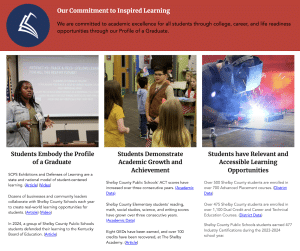Local Accountability in Shelby County, Kentucky: Leaning into What Matters
CompetencyWorks Blog
How can a district culture prioritize student achievement as something more than a standardized test score? What can a district lean into to emphasize what really matters: ensuring schools are vibrant places of learning where all stakeholders are accountable to the hopes and dreams of its students and its community? In Shelby County Public Schools, answering these questions to design a local accountability system with their community is a moral imperative.

STEP ONE: Think Differently
Our district began thinking differently about assessment and accountability more than eight years ago with the creation of our Profile of a Graduate. Shelby County Public Schools’ Profile has allowed for our district to develop a common understanding that we are preparing students to be much more than standardized test takers. Rather, we are ensuring that our graduates are Lifelong Learners, Critical Thinkers, and Effective Communicators, among others. Every fifth, eighth, and twelfth grade student in SCPS takes part in a Defense of Learning – a performance-based assessment where they synthesize their academic, personal, and professional growth into a presentation delivered to a panel of educators, family, and community members.
The power and authenticity of these assessments has been felt by all of our school stakeholders, from teachers and administrators to parents and business leaders. Because of the transformative success of our Defenses of Learning, our district continued to question how we could report and share our strengths and areas for improvement. We wanted to go beyond simplistically sharing standardized test scores in the local paper once a year.
STEP TWO: Ask Better Questions
Shelby County Public Schools has a long history of integrating the community into our school system. For example, our parents and community partners co-created our Profile of a Graduate with school leaders, and consistently participate in our Defenses of Learning. Over the last two years; however, we looked to deepen these ties with our community by drilling down to the essence of what they truly want from our schools. To get to the heart of our stakeholders’ wants and needs, we began by asking groups to answer three simple questions:
- What are your hopes and dreams for the students in our district?
- What do you feel matters most to our students and community?
- What measures do you want reported?
Our team ultimately met with over thirty unique groups, ranging from students and parents, to elected officials and business leaders. In each of these conversations, the plan was the same: ask the questions, sit back and listen, and take notes.
STEP THREE: Tell the Story
As we worked across the district, nine discrete themes began to emerge from these conversations, which we call Inspirations. We catalogued each of these Inspirations under our three commitments to the community based on our district’s vision of Inspired Learning, Leading, and Living.

Inspired Learning
- Students Embody the Profile of a Graduate
- Students Demonstrate Academic Growth and Achievement
- Students Have Relevant and Accessible Learning Opportunities
Inspired Leading
- Employees are Highly-Qualified Professionals
- Parents Express Satisfaction with their Child’s School Experience
- Employees Report Fulfillment in the Workplace
Inspired Living
- Students Feel a Sense of Safety and Belonging
- Schools Embrace the Shelby County Community
- Teachers, Students, and Staff Embody SCPS Core Values
In a spirit of transparency and accountability, we also developed improvement priorities to highlight the areas we must grow in and included details for how we plan to do so. Furthermore, we provided the raw data from our annual parent, student, and employee surveys and a subset of our aggregated academic data for those with a penchant for numbers. With these themes in hand, we sought out feedback on our community dashboard from the community itself. Our work was praised for its simplicity and transparency, but the most powerful message was their appreciation for allowing the narrative to drive the relevant data instead of allowing the data to drive the relevant narrative.
STEP FOUR: Promote and Support
Our district dashboard will be updated quarterly by the central office, but given that each of our schools has a unique instructional, social, and demographic context, our community also asked for the creation of school-based dashboards. The school-based dashboards offer a streamlined version of the district dashboard, allowing each school to highlight unique strengths, challenges, stories, and celebrations. These simplified dashboards will allow our leaders to move beyond social media posts for the promotion of their school, and will give each school a space for direct and transparent community communication.

Local Accountability Going Forward
While local accountability is an opportunity to create transformational change in the lives of our students and community, it is not a mechanism to avoid or downplay traditional assessment and accountability measures. In fact, state and national assessment data is prominently featured on our dashboard, as our community noted they wanted to easily see how student achievement has grown over time. This data is truly at the heart of local accountability, for our system utilizes multiple measures to tell a more complete story of student success instead of merely publishing numbers and metrics.
Asking our stakeholders what matters most to them – and then providing them with that information – is essential in creating trust and building a true partnership between the school system and the community. In education, we often let the world tell our story. Local accountability can be the tool to help schools, districts, and the field change the narrative in education so we can lean back into what really matters in education: there is no more important question school districts can ask their community than, “How can we better serve you?”
Learn More
Learn about local accountability in Kentucky and Shelby County:
- Kentucky United We Learn Assessment Prototype
- Kentucky United We Learn Local Accountability Town Halls
- Shelby County Public Schools Profile of a Graduate Dashboard
- Shelby County Public Schools Community Dashboard
- The Shelby Academy Community Dashboard
- Southside Elementary Community Dashboard
Learn about new accountability models:
- Opportunities for State and Local Collaboration to Design New Accountability Models
- Innovating Towards Next Generation Accountability
- Aurora Institute’s 2024 State Policy Priorities
 Dr. Adam Hicks, NBCT currently serves as the Assistant Superintendent of Curriculum, Instruction, and Assessment for Shelby County Public Schools (KY). Throughout his almost twenty years in public education, Adam has been an award-winning teacher, school and district administrator, and national education consultant. His professional areas of interest include local accountability and assessment, student voice, and collective teacher efficacy. Adam proudly resides in Simpsonville, Kentucky with his wife and three young children.
Dr. Adam Hicks, NBCT currently serves as the Assistant Superintendent of Curriculum, Instruction, and Assessment for Shelby County Public Schools (KY). Throughout his almost twenty years in public education, Adam has been an award-winning teacher, school and district administrator, and national education consultant. His professional areas of interest include local accountability and assessment, student voice, and collective teacher efficacy. Adam proudly resides in Simpsonville, Kentucky with his wife and three young children.
 Daniel Pfaff, Shelby County Public Schools’ Digital Learning Coordinator, mentors administrators and educators through using technology to enhance instruction and inclusivity. Buoyed by a Bachelor of Science in Marketing & Entrepreneurship, a JD / MBA in Finance & Entrepreneurship, and an MAT in Secondary Education, Dan has a passion for teaching and leadership. Over the last 18 years, he has taught courses spanning from traditional math to upper-level AP & dual credit courses. Dan has been recognized nationally for his efficacy and leadership, having earned the Spirit of DLAC Award winner at the annual Digital Learning Conference in February 2024.
Daniel Pfaff, Shelby County Public Schools’ Digital Learning Coordinator, mentors administrators and educators through using technology to enhance instruction and inclusivity. Buoyed by a Bachelor of Science in Marketing & Entrepreneurship, a JD / MBA in Finance & Entrepreneurship, and an MAT in Secondary Education, Dan has a passion for teaching and leadership. Over the last 18 years, he has taught courses spanning from traditional math to upper-level AP & dual credit courses. Dan has been recognized nationally for his efficacy and leadership, having earned the Spirit of DLAC Award winner at the annual Digital Learning Conference in February 2024.